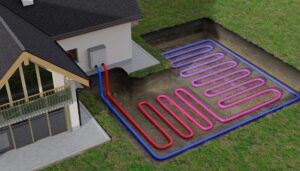Geothermal systems are incredible technological advancements. We’re only going to see more of them in the coming years, and they’re only going to get more efficient and powerful as technology advances. But, unfortunately, many people still don’t know how they work or if they’d be a good addition to their home.
Well, we’re here to provide a customers’ guide to geothermal in Jenks, OK. We’ll talk about how it works, the science behind the process, and why a geothermal system could be a wonderful potential investment for you and your family.
Leave it to a team of professional HVAC technicians to give you the facts. Geothermal systems aren’t for everyone. But if you have the budget and the home for one, it might end up being one of the best purchases you ever make in your lifetime. If you already have one and it’s underperforming, it may be time to check for geothermal system issues.
What Are HVAC Services and Why Geothermal Counts
HVAC services include:
- Installation of heating, cooling, and ventilation systems
- Maintenance to keep HVAC units running efficiently
- Repairs for broken or underperforming equipment
- Replacements of outdated or inefficient systems
- Geothermal systems, which qualify as HVAC because they:
- Provide both heating and cooling
- Use the earth’s consistent underground temperature
- Require professional service and maintenance like traditional units
The Ins and Outs of a Geothermal System
The ingenious nature of a geothermal system isn’t just from the technology, it’s from the source of it’s power: the Earth. Geothermal systems are basically heat pumps with one major catch. They use the abundant ambient heat energy from beneath the Earth’s crust, which is just a few feet below the ground for most homes in America.
Beneath your house, temperatures remain fairly consistent, between 40 to 50 degrees Fahrenheit. No matter what season it is, these temperatures will always be like this, rain or shine. This means that a heat pump could use this heat energy during the winter to heat your home, or use it as air conditioning when your home needs to be cooled down during the summer. Either option is a good one, and these systems run with superb efficiency as a result.
Why Are Geothermal Systems So Efficient?
So, what makes a goethermal HVAC system so efficient? It’s simple. The ambient temperature underground never really runs out and it never changes. You’ve always got access to heat during the winter and cooling during the summer, and all that’s required is an electrical pump to push it one way or the other.
Common air-sourced heat pumps don’t have that luxury. They often need to pull heat from frigid air during the winter, or cool down a home when temperatures are hot during the summer. Without a heat sink or a place underground to draw mild temperatures from, a heat pump will have to use more electricity to do the same job. A geothermal system can do what a regular air conditioner or heater can, but at a fraction of the cost on a regular basis.
Perks and Benefits of a Geothermal System
So, what other good reasons are there for investing in a geothermal system? They’re endless, but we’ll give you a few of the most common ones.
- Geothermal systems last a long time. The underground pipes of a geothermal system can last upwards of 50 years because they’re insulated from the elements. The heat pump components might not last as long, but they still last quite a while.
- They’re eco-friendly. Geothermal HVAC systems are environmental powerhouses. They’re efficient, powerful, long-lasting, and they run on electricity. This means you could power your geothermal unit with solar panels and other green upgrades. Homes converting from gas-based systems might also benefit from avoiding gas furnace risks, especially if safety and sustainability are top priorities.
- They only use electricity. For many homes that don’t have access to natural gas and only have abundant electricity, geothermal systems are perfect. These systems can run with only electricity, providing you with efficient heating and cooling from just a connection to the power grid. To make the most of this investment, be sure you’re working with a qualified and experienced HVAC company that understands geothermal technology inside and out.
Frequently Asked Questions
Question: How does a geothermal HVAC system function, in simple terms?
Answer: A geothermal system works like a heat pump that taps into the earth’s steady underground temperature. It transfers heat from the ground into your home during winter, and flips the process in summer, sending heat from your home into the ground for cooling.
Question: Why are geothermal systems more efficient than conventional heating or cooling systems?
Answer: Because underground temperatures remain relatively constant, geothermal systems don’t have to fight extreme outside air temperatures. They just use an electric pump to move heat, which demands far less energy than heating or cooling from ambient air.
Question: What are the main benefits of installing a geothermal HVAC system?
Answer: Key benefits include long-lasting underground piping (up to ~50 years), eco‑friendly operations (low emissions and electric-only), and lower operating costs over time.
Question: What are some challenges or downsides to geothermal systems?
Answer: The biggest obstacle is high upfront cost, especially for drilling and installing underground loops. Also, your property must be suitable (space, soil, ground conditions) for embedding these systems.
If you’re interested in geothermal technology, schedule an appointment with JC Mechanical, The Wizard of Blizzard!

